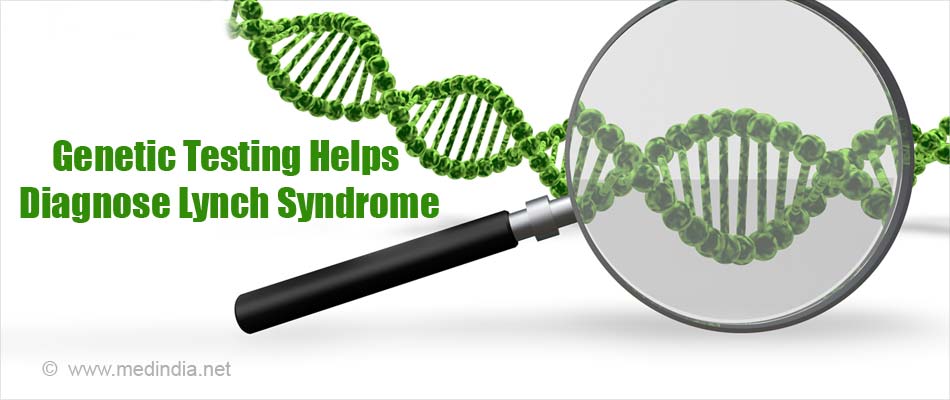- Lynch syndrome - (https://ghr.nlm.nih.gov/condition/lynch-syndrome#diagnosis)
What is Lynch Syndrome?
Lynch syndrome, formerly known as hereditary nonpolyposis colorectal cancer (HNPCC) syndrome, is an inherited condition that increases the risk of developing colon and rectal cancers. It is the most common hereditary cancer syndrome known to increase the risk of colorectal cancer. People who have Lynch syndrome also have an increased risk of: developing:
- Cancers of the stomach, small intestine, liver, gallbladder ducts, upper urinary tract, brain, and skin.
- Cancer of the ovaries and uterus in affected women.
- Small noncancerous (benign) growth known as polyps, in the colon. The number of polyps is usually less than 100.
What are the Causes of Lynch Syndrome?
All hereditary cancers are caused due to mutations in cancer predisposing genes. Lynch syndrome is caused due to mutations in one of four such genes - MLH1, MSH2, MSH6, or PMS2. These genes are known as mismatch repair (MMR) genes and they make proteins that are responsible for recognizing and correcting mistakes in our DNA. Our DNA is the genetic code of our body as it carries the information for growth, development, function, and reproduction. When the cells grow and multiply, DNA replicates to make a copy of itself, for newly formed cells. During this DNA replication process, it is common for some mistakes to occur. When this happens, MMR proteins recognize and repair these mistakes.
When one of these MMR genes is mutated, the MMR protein is faulty. Thus, it cannot recognize and correct the minor mistakes in the DNA. Accumulation of these mistakes in cells leads to instability, which eventually causes them to become cancerous.
Lynch syndrome is an autosomal dominant syndrome. This means that a mutation in one copy of an MMR gene (out of the two) is sufficient to increase the risk of cancer. An individual, who has a mutation in an MMR gene, has a 50 percent chance of passing it on to each child. Individuals, who inherit a mutated MMR gene, have an increased risk of developing cancer.
Mutations in the EPCAM gene, a gene that is located next to the MSH2 gene on the chromosome 2, also increases the risk of Lynch syndrome.
What are the Symptoms of Lynch Syndrome?
An individual’s personal or family history of cancer can help diagnose Lynch syndrome. If a family history suggestive of Lynch syndrome is present, the geneticist looks at the types of cancers in the family and the ages at which people were diagnosed with cancer.
The presence of the following could indicate the presence of Lynch syndrome, and will require investigation to confirm the same:
- An individual or a family member is diagnosed with colon cancer below the age of 50 years.
- A family history of Lynch syndrome-associated cancers (ovarian cancer, kidney cancer, stomach cancer, small intestine cancer, liver cancer, sweat gland cancer).
- Two first-degree relatives with colorectal carcinoma or Lynch-syndrome associated cancer, irrespective of age at diagnosis.
A family history of endometrial (uterine) cancer. Patients with colorectal cancer may present with the following symptoms:
- Blood in stools
- Anemia
- Abdominal cramps, bloating
- Unexplained weight loss

If you are concerned about your family history of colon cancer, you must seek genetic counseling. A genetic counselor will evaluate your medical and family history and determine your risk of hereditary colon cancer. He/she will help you understand the causes of Lynch syndrome, your risks of cancer and your options to manage those risks. He/she will also help you understand what genetic test is appropriate for you and your family and what the outcomes will mean for you and your family. He/she will discuss all your options with you and help you make informed decisions.
How do you Diagnose Lynch Syndrome?
If an individual is suspected to have Lynch syndrome, he/she can be asked to undergo specialised tests to confirm the diagnosis. These specialised tests include – tumour testing and genetic testing.
Tumour testing: The tumour tissue of people with Lynch syndrome has peculiar characteristics. When an individual who is affected with cancer is suspected to have Lynch syndrome, a biopsy sample of the tumour tissue can be tested in a pathology lab as a baseline screening for Lynch syndrome. There are two types of pathological tests that can be done:
- Immunohistochemistry (IHC) testing: This test uses staining dyes on the tumour tissue to determine the presence or absence of MMR proteins. Missing proteins can indicate which MMR gene may be mutated.
- Microsatellite instability (MSI) testing: Microsatellites are repetitive sequences in cellular DNA. Due to a lack of functioning MMR proteins, individuals with Lynch syndrome may have errors in these DNA sequences leading to instability in these regions. An MSI test evaluates the tumour tissue for MSI. If the MSI is high, it is indicative of a mutation in an MMR gene.
A positive IHC or MSI result does not give a definitive diagnosis of Lynch syndrome. IHC and MSI results indicate that the individual has mutations in an MMR gene. In some people, these genes can be mutated only in the cancer cells. Individuals with Lynch syndrome have the mutation in every single cell of their body. In order to confirm the diagnosis of Lynch syndrome, the individual must undergo molecular genetic testing.
Genetic Testing: Genetic testing is performed on DNA that is extracted either from your blood or saliva. This test looks for mutations in the MMR genes. The possible outcomes of a genetic test result are:

Mutation positive: This confirms the diagnosis of Lynch syndrome. First degree relatives of the affected individual can be tested for this family specific mutation (FSM) to assess their risk of cancer.
Mutation negative: Individuals, who test negative for the FSM, don’t have Lynch syndrome and their risk of cancer is the same as the general population. If an individual is the first to test in the family and has a negative test result, it does not eliminate the possibility of Lynch syndrome as they may have a mutation that cannot be identified by the current technology. He/she could still have an increased risk of cancer.
It is globally recommended that anyone who undergoes testing for Lynch syndrome, must undergo genetic counselling prior to testing. This is important for the individuals to understand Lynch syndrome and its associated risks, and their options for clinical management of this risk.
How do you Treat Lynch Syndrome?
Individuals with Lynch syndrome require specific screening and medical management, based on international guidelines.
Management of the affected individual: Individuals with Lynch syndrome who are affected with colon cancer will require removal of a longer part of the colon as compared to an individual with colon cancer who does not have Lynch syndrome. This is important to prevent recurrence of the colon cancer. These individuals will also need to undergo regular check-ups for risks of other cancers, as advised by the oncologist or genetic counselor.
Management of unaffected individuals: Individuals with Lynch syndrome who are not diagnosed with cancer are recommended to undergo regular screening tests for colon (colonoscopy) and other cancers. This helps doctors find tumors at earlier stages when they are more likely to get cured.
Surgical prevention: Surgical prevention is also an option that involves removal or organs that are likely to develop cancers. This eliminates the risk of developing cancer in that organ. In Lynch syndrome, individuals can opt for removal of parts or all of the colon and women can also opt to remove their uterus and ovaries (after completion of their family). These decisions can be difficult to make, therefore discussions with a genetic counselor will help in making the decision.
The management plan can differ from person to person, based on the personal and family history of cancer, and the genetic test result. For a customized management plan one must consult an oncologist or a genetic counselor.
Health Tips
Know your body: Make yourself aware of the symptoms of colon cancer and other Lynch syndrome-associated cancers. If you notice anything unusual, consult a doctor.
Visit doctor regularly: Follow your doctor’s advice carefully and go for regular screening and surveillance.
Healthy lifestyle: Maintain a healthy lifestyle and avoid smoking and intake of alcohol.









